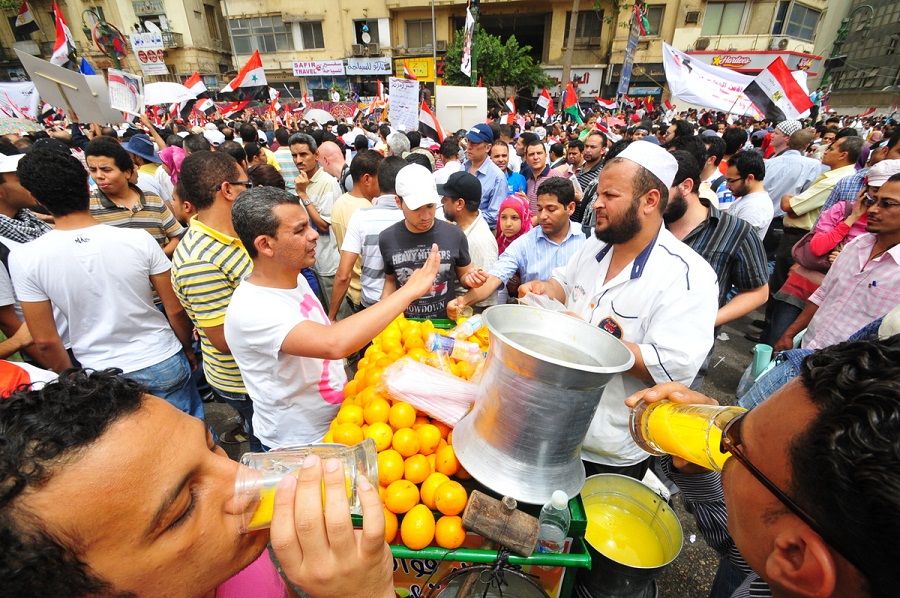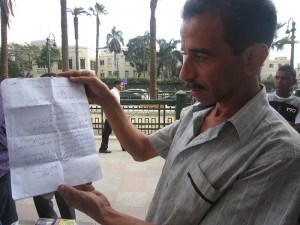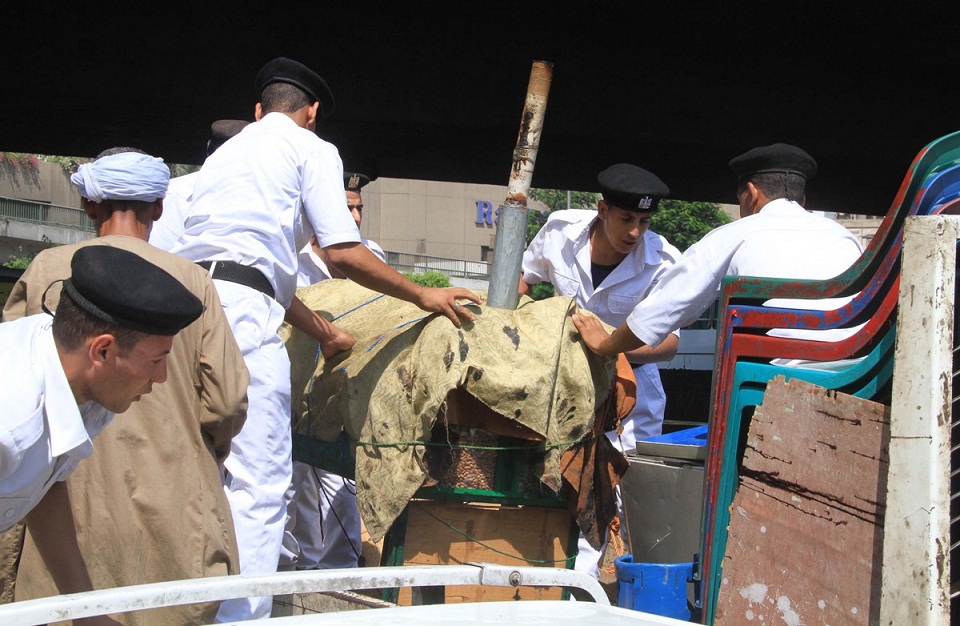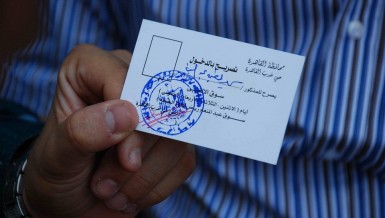
Egypt’s streets are congested with street vendors who often disrupt roads and pedestrians and increase traffic. They strive to maintain their sustenance and autonomy, but they are curbed by the police eviction policies that threaten to terminate their small businesses at any time.
Daily News Egypt speaks to vendors from Tahrir square and Talaat Harb Street, the head of Western Cairo neighbourhood directorate, and the head of the Federation for Economic Development Associations.
***
It is Monday. For Ali who lives on the outskirts of Cairo, his day starts at dawn. He jumps from one bus to another with his merchandise, and often heads to Downtown Cairo to buy what he needs for the day from merchants and wholesalers. Once he makes his purchase, the next destination is his regular vending spot at the Mogamma (a huge building with multiple governmental departments situated in Downtown Cairo).
The 14-storey building stands overlooking Tahrir square and provides a spacious plaza for street vendors to display their merchandise on low stands or straw mats. With more than a thousand offices in the building, it gets around 25,000 visitors and thousands of employees daily. This makes the plaza around the building a perfect place for street vendors, like Ali, who want to earn a living by selling their merchandise to visitors waiting for their paperwork to be finished.
Standing under the bright hot sun of the morning, Ali sets up his merchandise around 8:30 am joined by about 40 other street vendors who share the plaza; each knows his or her spot. Merchandise varied from shoes, to kitchenware, to stationary, to food.
Sitting there on one of the benches in front of the Mogamma, you can observe the dynamics and interactions. Vendors regard themselves as a family, of Muslims and Christians, men and women, adults and children. If a fight takes place, they mediate between its parties and peacefully resolve it. They cooperate, fill in for each other if someone runs a quick errand, and warn each other about police eviction campaigns.
On a typical day, Ali and his counterparts would have left the plaza at around 3:00 pm when the Mogamma’s employees finish work. However, that Monday the police forces paid them a visit around 10:30 am forcing them to leave. Some go immediately, while others are reluctant and attempt to negotiate with the police officer responsible for the campaign. One tries convincing the police to let them stay, but in vain. Like the rest, he eventually moves. In the next couple of days, the Mogamma is emptied of vendors.
The Mogamma is just one example of a myriad of locations that street vendors work in throughout Egypt. They occupy markets, metro stations, pavements, streets, and alleyways. Though, they have always constituted a problem, after the revolution the number of vendors swelled and with the lack of stability and security, the problem got out of control.
On the one hand, vendors disrupt traffic, crucial public spaces, and operate outside the formal economy. On the other, given its autonomy, flexibility and affordability, vending has become the only source of sustenance for millions of families.
Unfulfilled promises

Sarah Mohy El-Masry
Ali pulls his cart over to street aside the Mogamma. He has been selling kitchenware for 14 years. He explains that following the revolution the frequency of police clearances have increased notably. Having only received a vocational education and being the sole breadwinner of the family, vending is Ali’s resort.
Ali like the rest of the vendors, buys his merchandise from wholesalers. Instead of cash, he pays with two or three cheques of EGP 3,000 and then owes the wholesalers a debt. He has to pay these cheques or else he goes to jail. He added, “from my daily sales, I pay wholesalers back and buy new merchandise and the profit I get is for my children.”
He says, “I have three children all of them go to school and they are too young to help me. As long as I can come here I can provide for them. It’s only a problem when the police come.”
Sometimes the police take “suspicious” vendors to the police station to file a report and confiscate their merchandise. Depending on the vendor’s record, he or she could be released and handed back the merchandise, or if they have a criminal record, they could be imprisoned. Other times, the police give vendors time to leave if they were not occupying the streets.
Ali believes that having kiosks in a fixed place will avoid a police crackdown. He says, “we just want a humane place, that’s all.”
“I joined a group of vendors and went to the governor of Cairo, his vice and the head of the Western Cairo neighbourhood directorate (which supervises the Downtown area) to help us find places where we can sell our merchandise. They promised to dedicate a place to us, but there was no response,” he says.
Ali’s neighbour Khaled was among the group that went to the governorate. He takes papers from his shirt pocket and shows them to the crowd. He narrates his story.
He used to sell olives and lemons at the Mogamma before the police evicted him. They confiscated his scale, the barrels of olives, and umbrella he had. After the eviction, he went to the governorate and he got some paper work done to allow him to own a kiosk, but he still did not get it.
Khaled has epilepsy and he is the breadwinner of a family with four children.
He says enthusiastically, “we can stand here [pointing to a huge unused bare area surrounding the Mogamma], we won’t hold up the traffic, we won’t block the way to a bus station, and we won’t infringe on other people, on the contrary we’ll make it easier for them and more convenient.”
Ali asks, “should I steal? Should I sell drugs? I have to feed my children anyway, so I either do it rightfully or wrongfully.”
“We are not the problem”
Once the 32 year-old Mohamed starts talking, a group of younger vendors circle us, sipping their tea and listening. They nod along to what Mohamed says.

Mohamed Omar
He attempts to answer Ali’s question saying, “the government does not like the ugly scene we create, but that could be easily solved with some kiosks with an artistic touch, like the graffiti you’re seeing over there on the walls of the American University. At the end of the day vendors exist all around the world, not just in Egypt.”
Street vending is a parallel market to shops and malls. Vendors detect what people want (the demand) from the street and respond with an affordable supply. For each expensive product in shops and you will find its twin somewhere on the street. Vendors have a targeted customer who cannot afford to spend money on transportation, so they bring the product closer, on the corner of the street. They end up creating their own system, where the market barriers are low (for any vendor to enter) and demand is high.
Mohamed articulates why youth like him were interested in vending. In addition to unemployment and not having the qualifications for the job market, vending allowed for a great deal of autonomy. Vendors avoided the control of employers and had flexible working hours.
“The media propagates the problem of street vendors. If we are a problem then the state should find us a solution. If we are a bad element in the society then the state should fix us. They don’t create the problem then blame it on us at the end. If they bar us from vending, then they are leaving us no choice but to turn to illegal means,” he said.
Mohamed also has three children and has been selling counterfeit jewellery on a small stand at the Mogamma. He believes that the public has enough burdens. While the government is providing an inadequate health care system, inefficient means of transportation, low quality education, and no job opportunities, they should not be blamed for taking up vending.
“They [the government] don’t want to us work, nor are they providing job opportunities. We are not the problem, it’s their inefficiency and lack of planning,” he added.
He continued, “the government suggested holding a one-day market which is a good initiative, but what will we do for the rest of the week?”
Hany who sold sunglasses on straw mat next to Mohamed was tense. He was fed up with how the police fight their business.
He almost shouted, “before the revolution, it was better, we used to pay the policemen protection money, but they allowed us to work. Now we barely earn a living due to their continuous raids.”
He cried out, “we are not thugs we’re good people, take our national ID and investigate, you’ll find that none of us are thugs or have committed a crime.”
Hany has been vending for ten years. He spent his money on his family and his parents. He completely rejected the bad reputation that is propagated about vendors. He said, “we’re frustrated by the government, the media and everyone. People approach us to write stories for their newspapers, but we end up being labelled as bad people.”
In other close by street in Downtown Cairo, the problem is not any better. Talaat Harb Street is jammed with vendors and traffic is blocked most of the day.
On a street off Talaat Harb, you’ll find more women selling goods. Om Mohamed is seated uncomfortably on the pavement on cardboard and some plastic bags. She sits, leaning against a red car that behind her. She sells eggs and cottage cheese.
She says, “thankfully, my business has been going well. I commute every day from Balaks [a village in Qaliubiya about 24 kilometres from Downtown Cairo] and I buy my eggs and cheese in the early morning, bring my scale and settle here.”
She used to go around houses, but she stopped because the weight was too much for her to climb the stairs with. Unlike the angry men in the Mogamma, her experience with the police was positive. She said, “no one has ever come to me or asked me to leave, on the contrary, they came and bought from me sometimes.” She explained that she has been around for about 15 years and everyone knows her.
Friend or foe?
The vendors’ biggest concern remains the police. In ten minutes their profit could be drop to zero, if they are evicted. They cannot go to new places, because their counterparts in these places would not know or trust them and consequently would not agree to share the pavement with them.
Major General Yassin Abdel Bari, the head of Western Cairo neighbourhood directorate believes that the eviction campaigns have impacted the flow of traffic in Downtown Cairo greatly.
He said, “we hold campaigns to help evict vendors who block roads and streets. And once the eviction was carried out you notice the difference. In Tahrir for example, it’s palpable how evicting vendors eased the traffic.”
The responsible entities for the campaigns are the police and road disruption directorate. Both entities prepare a plan with the places that are crowded with vendors and the plan is implemented throughout the year.
However, Major Abdel Bari asserted, “we are considerate. Sometimes where there is wide pavement and vendors are only occupying a part of it, we leave them. We don’t intend to restrain people needlessly. Other times we have to evict everyone because leaving some would incite the rest.”
He elaborated how after the revolution, the culture of vending got out of control. He said, “vendors became rebellious, and with the law being unimplemented. It has been a great challenge for us.”
“The problem is that when someone comes here from a village in Upper Egypt and when they settle and their business starts running, they call on the rest of their families to join them,” he added.
The police monitor vendors closely and observe those who have been involved in crimes or escaped a court order. So the vendors are always filtered.
According to Major Abdel Bari, the government is currently considering a law that will regulate vendors and their activities; the law would include some jailing penalties and fines.
Not vendors, but entrepreneurs

Mohamed Omar
The complex nature of the problem is not impossible to reconcile. The government is trying to overcome traffic problems and keep order on the streets, but their attempts threaten the livelihood of about five to six million vendors with eviction campaigns according to the Federation for Economic Development Associations (FEDA).
Speaking to vendors revealed that their problem is not only about disrupting roads or increasing the traffic. Vendors are stigmatised because the nature of their business means they evade taxes and other financial obligations that normal merchants and shop owners pay. They are part of the informal economy, not regulated or overseen by the government and thus not included in the country’s production measures such as the Gross National Product (GNP).
Fouad Thabet the head of FEDA, an institution that works on policies for micro finance projects and a prominent entity involved in drafting street vendors law, thought, “if one of the revolution’s mantras was social justice, then vendors shouldn’t be marginalised.”
He said, “the government can formalise vending and incorporate it in the formal economy instead of keep it part of the informal sector. Vendors can help increase government revenues.”
He elaborated saying, “instead of having vendors paying protection money and bribes to the police to allow them to work, they can pay some sort of a fee and enjoy the protection of the state as well as social insurance.”
Many are sceptical about whether vendors would want to commit to such fee, but a survey FEDA carried out in 2009 involving vendors from governorates such as Cairo, Giza, Alexandria, Minya and Beni Suef supported that premise. The survey showed that street vendors in Egypt would like to enjoy an insurance system, pay a yearly fee to be able to sell his or her merchandise, and welcome a law regulating his or her work, as long as it ensures improving their social status.
Thabet said, “it’s true that the vendors want to enjoy a great level of freedom, but if they were given a law that at least provides a safe atmosphere for them, they will compromise.”
He followed the recommendation of Hernando de Soto, the renowned Peruvian economist who visited Egypt for his research. De Soto believed that Egyptians needed to change their perception of the informal economy in general since it was buoyant and it was regarded as “Egypt’s biggest employer” bigger than both the public and private sectors.
Thabet said, “vendors are entrepreneurs who have small businesses that need endorsement. In countries around the world street vendors are an integral part of the economy and countries like India, Indonesia and Philippines have legislation for them. Egypt should follow.”
He spoke of previous attempts to involve the government in drafting a law for vendors. He pointed out that the municipalities cooperated for a while in 2009, but the discussion ceased.
Thabet believed that any communication concerning vendors would need to involve them and have their input. They should be the key stakeholders in the decision making process because they are the most knowledgeable of their needs.
“Currently we’re communicating with the government and we’re working on developing a plan to establish markets for vendors. We have made sure to involve vendors from all governorates,” he added.
Policing street vendors is only superficially solving the problem, ignoring the economic and legal questions that vendors raised. Answering the more complicated questions requires changing the government philosophy; rather than seeking to terminate their small businesses the government can capitalise on their presence.
All the vendors agreed that eviction is pushing them to the limit. What Egypt needs to do to overcome the challenges street vendors pose, is to study their needs and what incentives they wish to have.
Hany, the angry vendor from the Mogamma, says “the Tunisian revolution broke out because of a vendor who was slapped. They [the government and police] are testing our patience. If they keep the up pressure, we will turn the tables on them. Taxis held their sit-ins, so did microbus drivers, if vendors held a sit-in, the whole country would freeze.”



